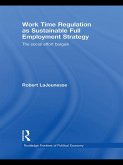Andrew Brady
Unions and Employment in a Market Economy (eBook, ePUB)
Strategy, Influence and Power in Contemporary Britain
42,95 €
42,95 €
inkl. MwSt.
Sofort per Download lieferbar

21 °P sammeln
42,95 €
Als Download kaufen

42,95 €
inkl. MwSt.
Sofort per Download lieferbar

21 °P sammeln
Jetzt verschenken
Alle Infos zum eBook verschenken
42,95 €
inkl. MwSt.
Sofort per Download lieferbar
Alle Infos zum eBook verschenken

21 °P sammeln
Andrew Brady
Unions and Employment in a Market Economy (eBook, ePUB)
Strategy, Influence and Power in Contemporary Britain
- Format: ePub
- Merkliste
- Auf die Merkliste
- Bewerten Bewerten
- Teilen
- Produkt teilen
- Produkterinnerung
- Produkterinnerung

Bitte loggen Sie sich zunächst in Ihr Kundenkonto ein oder registrieren Sie sich bei
bücher.de, um das eBook-Abo tolino select nutzen zu können.
Hier können Sie sich einloggen
Hier können Sie sich einloggen
Sie sind bereits eingeloggt. Klicken Sie auf 2. tolino select Abo, um fortzufahren.

Bitte loggen Sie sich zunächst in Ihr Kundenkonto ein oder registrieren Sie sich bei bücher.de, um das eBook-Abo tolino select nutzen zu können.
This book will evidence how trade unions were able to offset environmental constraints through a progressive focus on political action, despite diminished power in the Labour Party's structures and the wider economy.
- Geräte: eReader
- mit Kopierschutz
- eBook Hilfe
- Größe: 2.39MB
Andere Kunden interessierten sich auch für
![Trade Unions in the Course of European Integration (eBook, ePUB) Trade Unions in the Course of European Integration (eBook, ePUB)]() Martin SeeligerTrade Unions in the Course of European Integration (eBook, ePUB)44,95 €
Martin SeeligerTrade Unions in the Course of European Integration (eBook, ePUB)44,95 €![Unions and Employment in a Market Economy (eBook, PDF) Unions and Employment in a Market Economy (eBook, PDF)]() Andrew BradyUnions and Employment in a Market Economy (eBook, PDF)42,95 €
Andrew BradyUnions and Employment in a Market Economy (eBook, PDF)42,95 €![Trade Unions and the British Industrial Relations Crisis (eBook, ePUB) Trade Unions and the British Industrial Relations Crisis (eBook, ePUB)]() Peter AckersTrade Unions and the British Industrial Relations Crisis (eBook, ePUB)42,95 €
Peter AckersTrade Unions and the British Industrial Relations Crisis (eBook, ePUB)42,95 €![Work Time Regulation as Sustainable Full Employment Strategy (eBook, ePUB) Work Time Regulation as Sustainable Full Employment Strategy (eBook, ePUB)]() Robert LajeunesseWork Time Regulation as Sustainable Full Employment Strategy (eBook, ePUB)59,95 €
Robert LajeunesseWork Time Regulation as Sustainable Full Employment Strategy (eBook, ePUB)59,95 €![The Routledge Companion to Employment Relations (eBook, ePUB) The Routledge Companion to Employment Relations (eBook, ePUB)]() The Routledge Companion to Employment Relations (eBook, ePUB)44,95 €
The Routledge Companion to Employment Relations (eBook, ePUB)44,95 €![Careers and Talent Management (eBook, ePUB) Careers and Talent Management (eBook, ePUB)]() Cristina ReisCareers and Talent Management (eBook, ePUB)23,95 €
Cristina ReisCareers and Talent Management (eBook, ePUB)23,95 €![International and Comparative Employment Relations (eBook, ePUB) International and Comparative Employment Relations (eBook, ePUB)]() International and Comparative Employment Relations (eBook, ePUB)60,95 €
International and Comparative Employment Relations (eBook, ePUB)60,95 €-
-
-
This book will evidence how trade unions were able to offset environmental constraints through a progressive focus on political action, despite diminished power in the Labour Party's structures and the wider economy.
Dieser Download kann aus rechtlichen Gründen nur mit Rechnungsadresse in A, B, BG, CY, CZ, D, DK, EW, E, FIN, F, GR, HR, H, IRL, I, LT, L, LR, M, NL, PL, P, R, S, SLO, SK ausgeliefert werden.
Produktdetails
- Produktdetails
- Verlag: Taylor & Francis eBooks
- Seitenzahl: 226
- Erscheinungstermin: 4. März 2019
- Englisch
- ISBN-13: 9781351035446
- Artikelnr.: 56548383
- Verlag: Taylor & Francis eBooks
- Seitenzahl: 226
- Erscheinungstermin: 4. März 2019
- Englisch
- ISBN-13: 9781351035446
- Artikelnr.: 56548383
- Herstellerkennzeichnung Die Herstellerinformationen sind derzeit nicht verfügbar.
Andrew Brady is an academic with a PhD from the University of Strathclyde and works in the British labour movement.
List of Tables
List of Boxes
Preface
Chapter 1: Trade Union Strategy, Influence and Power in Contemporary
Britain: An Introduction
Introduction
Varieties of Capitalism
Deconstruction and Reconstruction
New Labour: Continuation of neoliberalism or breaking with the past?
Labour Party: A Channel for Trade Union Political Action
Trade Union Leadership, Strategy and Structure
Conclusion
Chapter 2: The Social Contract (1974-79)
Introduction
Donovan Commission and In Place of Strife
The Industrial Relations Act (1971)
The Social Contract in Formation
The Social Contract in Operation
The Winter of Discontent 1978/9
Evaluation and Reflections
Chapter 3: Employment Relations Reform under New Labour: Context,
Continuity and Change
Introduction
Conservative Liberal Market Reform
Political Action: New Mechanisms
Ideological Disunity, Space and Convergence: Opposition Years
Progressive Centralisation
Formal to Informal Processes
1993/7 Political Fund Ballots
New Policy-Making Processes
Agency and Diminishing Trust
Chapter 4: The National Minimum Wage (1998)
Introduction
The Development of the NMW
The Low Pay Commission
Policy contestation and division
Evaluation and Reflections
Chapter 5: The Employment Relations Act (1999)
Introduction
Fairness at Work (May 1998)
Employment Relations Bill
ERA (1999)
Evaluation and Reflections
Chapter 6: The Warwick Agreement (2004)
Introduction
Exeter Policy Forum (2000)
Leadership Dynamics
The Big Four
Institutional Reconfiguration: TULO
The Agreement Implementation
Evaluation and Reflections
Chapter 7: Strategy, Influence and Power: lessons from history
Introduction
Structural Context: shifting fronts
Degree of Coordination
Transition to Informality
Concluding Observations
Chapter 8: Conclusion
Leadership and Strategic Choice
Political Action and Electoral Reform
New Structural Pressures
Appendix A: List of Interviews as Introduced
Appendix B: Key provisions of the Employment Act 2002
Appendix C: Key Warwick Agreement pledges
Glossary
Index
List of Boxes
Preface
Chapter 1: Trade Union Strategy, Influence and Power in Contemporary
Britain: An Introduction
Introduction
Varieties of Capitalism
Deconstruction and Reconstruction
New Labour: Continuation of neoliberalism or breaking with the past?
Labour Party: A Channel for Trade Union Political Action
Trade Union Leadership, Strategy and Structure
Conclusion
Chapter 2: The Social Contract (1974-79)
Introduction
Donovan Commission and In Place of Strife
The Industrial Relations Act (1971)
The Social Contract in Formation
The Social Contract in Operation
The Winter of Discontent 1978/9
Evaluation and Reflections
Chapter 3: Employment Relations Reform under New Labour: Context,
Continuity and Change
Introduction
Conservative Liberal Market Reform
Political Action: New Mechanisms
Ideological Disunity, Space and Convergence: Opposition Years
Progressive Centralisation
Formal to Informal Processes
1993/7 Political Fund Ballots
New Policy-Making Processes
Agency and Diminishing Trust
Chapter 4: The National Minimum Wage (1998)
Introduction
The Development of the NMW
The Low Pay Commission
Policy contestation and division
Evaluation and Reflections
Chapter 5: The Employment Relations Act (1999)
Introduction
Fairness at Work (May 1998)
Employment Relations Bill
ERA (1999)
Evaluation and Reflections
Chapter 6: The Warwick Agreement (2004)
Introduction
Exeter Policy Forum (2000)
Leadership Dynamics
The Big Four
Institutional Reconfiguration: TULO
The Agreement Implementation
Evaluation and Reflections
Chapter 7: Strategy, Influence and Power: lessons from history
Introduction
Structural Context: shifting fronts
Degree of Coordination
Transition to Informality
Concluding Observations
Chapter 8: Conclusion
Leadership and Strategic Choice
Political Action and Electoral Reform
New Structural Pressures
Appendix A: List of Interviews as Introduced
Appendix B: Key provisions of the Employment Act 2002
Appendix C: Key Warwick Agreement pledges
Glossary
Index
List of Tables
List of Boxes
Preface
Chapter 1: Trade Union Strategy, Influence and Power in Contemporary
Britain: An Introduction
Introduction
Varieties of Capitalism
Deconstruction and Reconstruction
New Labour: Continuation of neoliberalism or breaking with the past?
Labour Party: A Channel for Trade Union Political Action
Trade Union Leadership, Strategy and Structure
Conclusion
Chapter 2: The Social Contract (1974-79)
Introduction
Donovan Commission and In Place of Strife
The Industrial Relations Act (1971)
The Social Contract in Formation
The Social Contract in Operation
The Winter of Discontent 1978/9
Evaluation and Reflections
Chapter 3: Employment Relations Reform under New Labour: Context,
Continuity and Change
Introduction
Conservative Liberal Market Reform
Political Action: New Mechanisms
Ideological Disunity, Space and Convergence: Opposition Years
Progressive Centralisation
Formal to Informal Processes
1993/7 Political Fund Ballots
New Policy-Making Processes
Agency and Diminishing Trust
Chapter 4: The National Minimum Wage (1998)
Introduction
The Development of the NMW
The Low Pay Commission
Policy contestation and division
Evaluation and Reflections
Chapter 5: The Employment Relations Act (1999)
Introduction
Fairness at Work (May 1998)
Employment Relations Bill
ERA (1999)
Evaluation and Reflections
Chapter 6: The Warwick Agreement (2004)
Introduction
Exeter Policy Forum (2000)
Leadership Dynamics
The Big Four
Institutional Reconfiguration: TULO
The Agreement Implementation
Evaluation and Reflections
Chapter 7: Strategy, Influence and Power: lessons from history
Introduction
Structural Context: shifting fronts
Degree of Coordination
Transition to Informality
Concluding Observations
Chapter 8: Conclusion
Leadership and Strategic Choice
Political Action and Electoral Reform
New Structural Pressures
Appendix A: List of Interviews as Introduced
Appendix B: Key provisions of the Employment Act 2002
Appendix C: Key Warwick Agreement pledges
Glossary
Index
List of Boxes
Preface
Chapter 1: Trade Union Strategy, Influence and Power in Contemporary
Britain: An Introduction
Introduction
Varieties of Capitalism
Deconstruction and Reconstruction
New Labour: Continuation of neoliberalism or breaking with the past?
Labour Party: A Channel for Trade Union Political Action
Trade Union Leadership, Strategy and Structure
Conclusion
Chapter 2: The Social Contract (1974-79)
Introduction
Donovan Commission and In Place of Strife
The Industrial Relations Act (1971)
The Social Contract in Formation
The Social Contract in Operation
The Winter of Discontent 1978/9
Evaluation and Reflections
Chapter 3: Employment Relations Reform under New Labour: Context,
Continuity and Change
Introduction
Conservative Liberal Market Reform
Political Action: New Mechanisms
Ideological Disunity, Space and Convergence: Opposition Years
Progressive Centralisation
Formal to Informal Processes
1993/7 Political Fund Ballots
New Policy-Making Processes
Agency and Diminishing Trust
Chapter 4: The National Minimum Wage (1998)
Introduction
The Development of the NMW
The Low Pay Commission
Policy contestation and division
Evaluation and Reflections
Chapter 5: The Employment Relations Act (1999)
Introduction
Fairness at Work (May 1998)
Employment Relations Bill
ERA (1999)
Evaluation and Reflections
Chapter 6: The Warwick Agreement (2004)
Introduction
Exeter Policy Forum (2000)
Leadership Dynamics
The Big Four
Institutional Reconfiguration: TULO
The Agreement Implementation
Evaluation and Reflections
Chapter 7: Strategy, Influence and Power: lessons from history
Introduction
Structural Context: shifting fronts
Degree of Coordination
Transition to Informality
Concluding Observations
Chapter 8: Conclusion
Leadership and Strategic Choice
Political Action and Electoral Reform
New Structural Pressures
Appendix A: List of Interviews as Introduced
Appendix B: Key provisions of the Employment Act 2002
Appendix C: Key Warwick Agreement pledges
Glossary
Index







